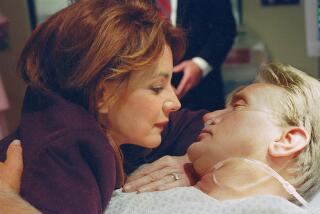Throwing the Book at Them : Adaptation of ‘A Time to Kill’ Presents Its Case at Full Throttle
The movie version of John Grisham’s “A Time to Kill” is as unstoppable as a furious river at flood tide. Oblivious to niceties like subtlety, plausibility and discretion, it rushes heedlessly toward its destination of audience arousal. Like a flood, the impact is undeniable but it’s not something everyone will want to get in the way of.
The story of a young Southern lawyer who defends a black man accused of murdering the white rapists of his 10-year-old daughter, “A Time to Kill” was Grisham’s first novel and by his own admission came from the heart. As such he demanded, and received, considerable input into the film version, and it was his idea to put Joel Schumacher in charge.
As the director of Grisham’s previous “The Client” as well as “Batman Forever” (both of them co-scripted by “Time” screenwriter Akiva Goldsman), Schumacher has always had a knack for popular filmmaking and a passion for total manipulation, but his go-for-the-jugular approach gets taken to new heights here.
With full throttle as his cruising speed of choice, Schumacher directs as if nuance were a capital offense. Not trusting even the best-selling novel’s instincts, Schumacher and screenwriter Goldsman, determined to squeeze the maximum possible impact out of situations, have made several small but critical changes in the plot, including putting a key closing speech in a different character’s mouth. It’s hard to think of another director who could make Grisham’s pulp fiction look restrained by comparison, but Schumacher manages.
Still, being anything but bemused at “A Time to Kill’s” antics is as pointless as getting angry at an infant who misbehaves. While the director’s relish for pushing every button within reach is excessive, you have to shake your head and admire the jaw-dropping effrontery of the attempt. If nothing else, Schumacher’s love for unalloyed shamelessness is sincere and that gives “A Time to Kill” a core watchability that many other commercial projects lack.
Despite what you’ve been reading, it’s not Matthew McConaughey, the hunky young actor with a profile like a Roman coin, who is the key to “A Time to Kill’s” success. McConaughey does an impeccable movie-star turn as Jake Brigance, the most ambitious and talented attorney in tiny Canton, Miss., and doubtless has a lucrative career ahead of him, but in the acting department he is the runner-up.
*
No. 1 with a bullet, so to speak, is Samuel L. Jackson as Carl Lee Hailey, the African American lumberyard worker whose young daughter Tonya (Raeven Larrymore Kelly) is brutally raped in an opening scene that in its own way is as much an assault on the audience as it is on the victim.
Not only is the act itself wrenchingly presented, with the perpetrators shown as unwashed, tattooed Southern Gothic hellhounds reeking of stereotypical menace, but Tonya’s innocence is emphasized, in a way the book avoided, by showing her delicately choosing eggs one at a time at the local grocery store just before the attack.
As the distraught, outraged father who decides to take justice into his own hands (after first sounding out Brigance about representing him), Jackson brings an anguish and an integrity to the role that no one else matches. His focus and intensity make even the most implausible speeches sound reasonable, and the film stops dead for all the right reasons when he’s on the screen.
Uncertain about the possibilities for a fair trial, even in the New South, and overmatched by aggressive Dist. Atty. Rufus Buckley (a fine spit-and-polish performance, all cockiness and malevolent self-assurance, from Kevin Spacey), Brigance has numerous other worries as well. Both the NAACP and the Ku Klux Klan are eager to use the upcoming trial for their own purposes and, closer to home, his Ole Miss wife Carla (an uncomfortable Ashley Judd), is unnerved by the pressures of the situation.
Not overly daunted, Brigance pulls together an unorthodox “Seven Samurai”-type legal team led by his mentor Lucien Wilbanks (Donald Sutherland), a legal whiz now both drunk and decertified. Other members include cynical divorce lawyer pal Harry Rex Vonner (Oliver Platt), legal secretary Ethel Twitty (Brenda Fricker) and, the most photogenic member of the group, whip-smart law student Ellen Roark.
Given that Roark is played by viewer-friendly Sandra Bullock, it’s not surprising that this role is considerably beefed up from the book, with Roark given a resume that would impress a Supreme Court justice. Even though it takes Brigance about two minutes to agree to employ her in the novel, the movie, typically looking for every opportunity to pull the audience’s chain, has Brigance play the tease, turning down her offer to work for free again and again for what seems like weeks even though there is not a smidgen of doubt about his decision.
With a scenario predetermined enough to satisfy John Calvin, “A Time to Kill” is most problematical when it thinks it is saying something significant. Not content with its ability to make audiences jump and shout, the film insists it’s exploring weighty issues like the right or wrong of Carl Lee Hailey’s act. That’s one case even Jake Brigance couldn’t win.
* MPAA rating: R, for violence and some graphic language. Times guidelines: graphic depiction of the rape of a child, shotgun murders, racial riots.
(BEGIN TEXT OF INFOBOX / INFOGRAPHIC)
‘A Time to Kill’
Matthew McConaughey: Jake Brigance
Sandra Bullock: Ellen Roark
Samuel L. Jackson: Carl Lee Hailey
Kevin Spacey: Rufus Buckley
Oliver Platt: Harry Rex Vonner
Charles S. Dutton: Sheriff Ozzie Walls
Brenda Fricker: Ethel Twitty
Donald Sutherland: Lucien Wilbanks
Kiefer Sutherland: Freddie Cobb
An Arnon Milchan production, in association with Regency Enterprises, released by Warner Bros. Director Joel Schumacher. Producers Arnon Milchan, Michael Nathanson, Hunt Lowry, John Grisham. Screenplay Akiva Goldsman, based on the novel by John Grisham. Cinematographer Peter Menzies Jr. Editor William Steinkamp. Costumes Ingrid Ferrin. Music Elliot Goldenthal. Production design Larry Fulton. Art director Richard Toyon. Set designers Keith P. Cunningham, Maya Shimoguchi. Set decorator Dorree Cooper. Running time: 2 hours, 24 minutes.
* In general release throughout Southern California.
More to Read
Only good movies
Get the Indie Focus newsletter, Mark Olsen's weekly guide to the world of cinema.
You may occasionally receive promotional content from the Los Angeles Times.











